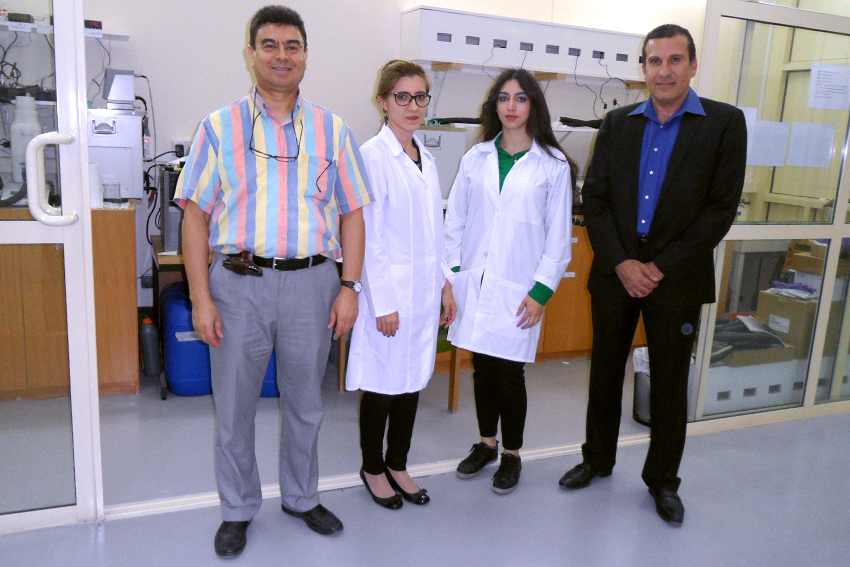A research project conducted by faculty and students at Qatar University College of Engineering (QU-CENG), in collaboration with a team from ConocoPhillips Global Water Sustainability Center, and in partnership with Qatar Water and Electricity Company (QEWC), has pioneered desalination technology with less carbon footprint to produce fresh water in Qatar.

Led by CENG Department of Chemical Engineering professor of chemical engineering Dr Farid Benyahia, the research project was supported by Qatar University (QU) and funded by ConocoPhillips. It is part of an agreement signed in October 2011 between QU and the industry giant’s Global Water Sustainability Center, aimed at helping QU to build capacity in research in the emerging desalination technology called membrane distillation.
Using a process called membrane distillation desalination, the team found that a hydrophobic membrane prevents salty water from passing through and allows fresh water vapor to permeate and condense. The process required only a low temperature feed of salty water, often not exceeding 80ºC, and low usage of atmospheric pressure.
To test the new technology, two pilot plants exploiting membrane distillation were commissioned and deployed at the Ras Bou Fantas power and desalination plant. Positive results from the tests highlighted a need to improve membrane properties for long-term usage, and combine thermal integration with existing chemical processes in Qatar. The aim is to exploit the vast amount of low-grade heat that is currently being dissipated into the environment, and in so doing, contribute to reducing energy consumption for fresh water production, and produce cheaper fresh water where needed.
Commenting on the research, Dr Benyahia said: “This pioneering study underlines the level of research being conducted at Qatar University and the role of the College of Engineering in making significant contribution to development priorities in Qatar, such as water security and environment protection. Desalination to produce fresh water is critical for dryland areas such as Qatar, and the College is well placed to lead in building capacity for this fast-emerging technology that will ultimately serve as a sustainable solution to Qatar’s water challenges. The students have benefitted in no small measure from their participation in this study as it provided them the opportunity to gain knowledge in an area that is of immense importance to Qatar and the Gulf region, as well as further insight into the world of scientific innovation and discovery that advances efficient smart technologies that will do no harm to the environment. It is a proud moment for us all.”
PhD student in environmental engineering at Hamad bin Khalifa University (HBKU) and current Qatar Foundation (QF) research associate Ahmad Fard said: “This project gave me the opportunity to participate in the water grand challenge, which was recently identified by Qatar as one of the two grand challenges it faces. It also helped me to find my research track in the field of water and environment.”
His colleague Yehia Manawi said: “The research experience I had on this project taught me the basic science of desalination, and also opened the door for me to further explore it. This served to strengthen my pursuit of a PhD degree in the fabrication and modification of a desalination membrane which combines both desalination and material sciences.”
Environmental engineering Masters student Amira Al-Khatib said: “This research gave me the opportunity to gain a wide range of practical skills, such as water quality measurement and identification of problems that affect results, as well as knowledge of the various membrane configurations and processes, and much more.”
QU chemical engineering graduate (2014) and current Qatar Petrochemical Company (QAPCO) process engineer Abdulla Al-Oodani said: “I benefited considerably from this research project, gaining hands-on experience in operating state-of-the-art membrane distillation apparatus designed and built at QU Chemical Engineering Department, and learning how to model a new desalination technology. One day this new knowledge and practical experience will serve me very well.”
About Qatar University:
Qatar University is one of the leading institutions of academic and research excellence in the GCC region. It provides high quality undergraduate and graduate programs that prepare competent graduates, primed to shape the future of Qatar. The organization’s strong relationship with Qatari society is reflected in its community service efforts and in its vibrant research portfolio that addresses relevant local and regional challenges, advances national goals towards a knowledge-based economy, and contributes actively to the needs and aspirations of society.
For more information, visit: www.qu.edu.qa
0 COMMENTS